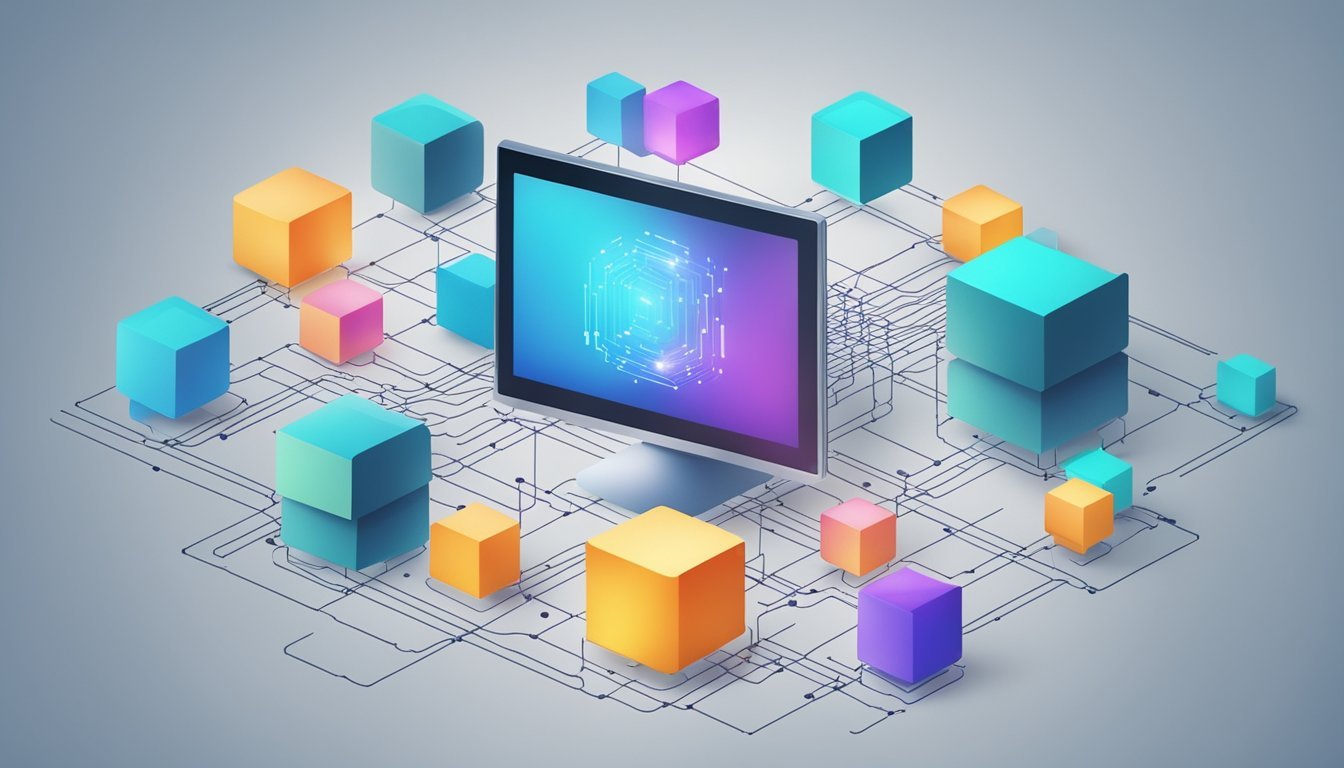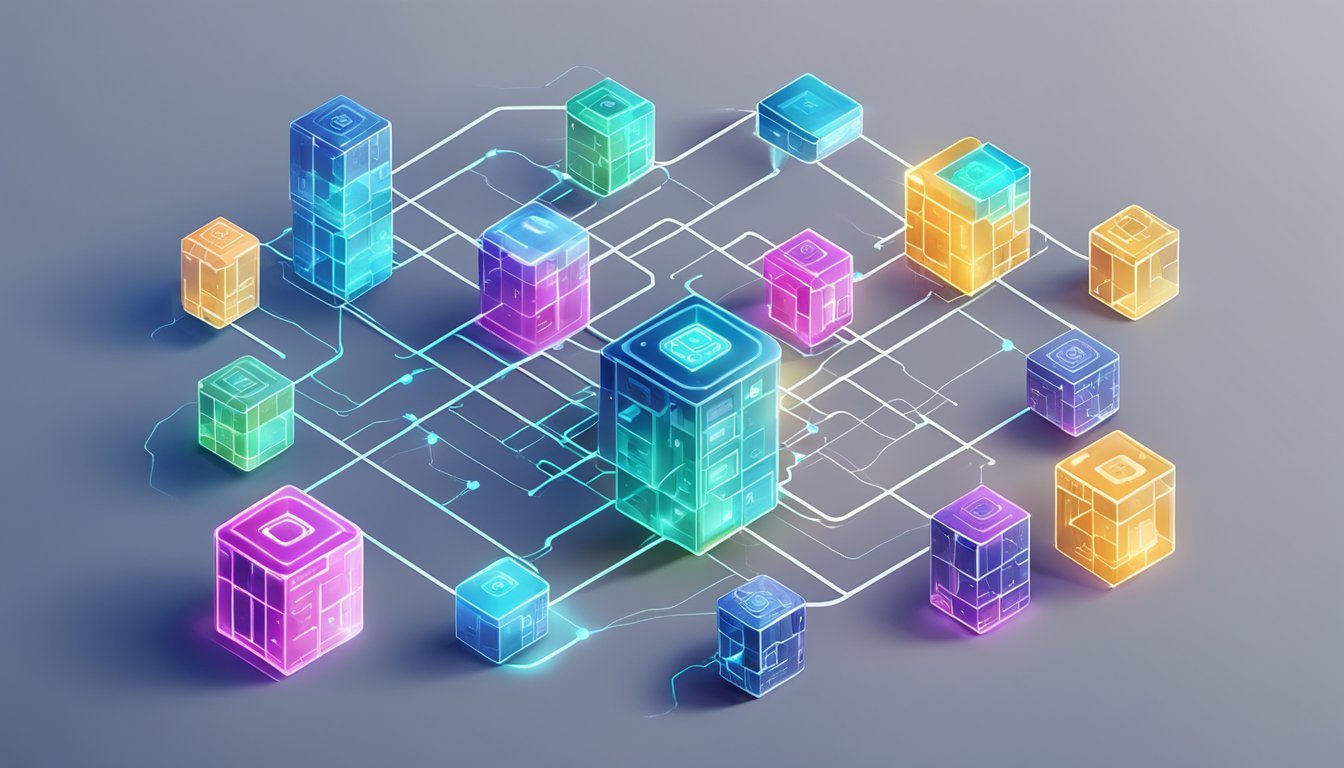Revolutionizing Tech: How Blockchain Fuels Innovation & Security
Blockchain technology stands at the forefront of modern digital innovation, offering a robust architecture that enhances the reliability and security of online transactions. It operates as a decentralized public ledger that records digital transactions across multiple computers, in such a way that the record cannot be altered retroactively without altering all subsequent blocks. This immutability is what makes blockchain a game-changer in various sectors, particularly in banking, supply chain management, and secure data transfer.
As an emerging technology, blockchain's influence extends beyond its initial application in cryptocurrency management. Now, with the digital economy expanding and the rise of digital assets, the potential applications for blockchain have multiplied. Businesses and entrepreneurs are exploring how this technology can provide solutions that are not only more secure but also increase efficiency and transparency.
This technological ingenuity is propelling innovation across industries by fostering trust in digital interactions. Inciting a paradigm shift in how data is shared and stored, blockchain is becoming a critical component in the evolution of digital ecosystems. With its distributed ledger capability, blockchain is setting the stage for a new era of tech innovation, where the integrity of digital assets and their transactions are maintained with unprecedented security and transparency.
Blockchain Fundamentals
Blockchain technology is a transformative force in the landscape of tech innovation, reshaping how transactions are recorded and assets are managed across multiple industries. The fundamentals of blockchain encompass its developmental history, intricate architecture, and the various types that are in use today.
History and Evolution
The inception of blockchain dates back to 2008 when an individual or a group under the pseudonym Satoshi Nakamoto introduced it as the underlying technology for Bitcoin. What started as a means to support a decentralized digital currency evolved into a versatile framework for numerous applications beyond cryptocurrency.
Core Components and Architecture
At the heart of blockchain is the ledger, a distributed database maintaining a continuously growing list of records, or blocks, which are linked and secured using cryptography. Transactions once recorded are immutable and time-stamped, creating an indelible history. Blockchain's architecture is decentralized, meaning it operates on a peer-to-peer network where all participants have access to the entire database and its complete history.
Types of Blockchains
Blockchains can be classified primarily into three categories:
Public blockchain networks, like Bitcoin, are open and anyone can join and participate in the network.
Consortium blockchains involve a group of organizations controlling the network, combining decentralization with more control.
Private blockchains are permissioned networks where access is restricted to a particular organization.
Each type serves different needs and has distinct implications for the degree of oversight and transparency within the network.
Blockchain Technology in Practice
Blockchain technology has evolved into a robust platform for peer-to-peer transactions and applications, beyond mere digital currencies.
Understanding Transactions
Transactions in the blockchain are data structures that encode the transfer of value between participants in the blockchain network. They are securely recorded on a distributed ledger, ensuring transparency and immunity from alteration. When JPMorgan Chase moved to use blockchain, the technology's innate security features were a focal point.
Smart Contracts and Decentralized Applications
Smart contracts are self-executing contracts with the terms directly written into lines of code. They are the backbone of decentralized applications (dApps) that run on a blockchain network. These applications enable a variety of services from decentralized finance to gaming, without the need for intermediaries. Blockchain's immutable ledger ability renders contracts tamper-proof, fostering trust among parties.
Mining, Validation, and Consensus Mechanisms
Mining involves nodes in a blockchain network competing to solve complex cryptographic challenges — a mechanism known as Proof-of-Work (PoW). However, due to energy concerns, many networks are transitioning to Proof-of-Stake (PoS) for validation. Both PoW and PoS are consensus mechanisms that ensure transactions are confirmed and added to the blockchain in a trustless environment. Each participating node has a copy of the ledger for validation purposes, ensuring accuracy and resistance to fraudulent transactions.
Blockchain's Impact on Industries
Blockchain technology has ushered in radical changes across a wide range of industries, leveraging its core characteristics of decentralization, immutability, and transparency.
Fintech and Cryptocurrencies
The fintech industry has been revolutionized by blockchain's introduction of Bitcoin and other cryptocurrencies, creating a new paradigm for digital currency. These advancements have enabled decentralized financial transactions, challenging traditional banking and opening up possibilities for peer-to-peer transactions without the need for intermediaries. A blockchain network in fintech heightens transparency and security, empowering users with more control over their assets.
Supply Chain Management
In supply chain management, blockchain's immutable ledger provides unmatched transparency and traceability, allowing for the verification of authenticity and the origin of products. This proves crucial in enhancing the strategy and management of supply chains, minimizing losses due to counterfeits, and ensuring compliance. IoT integration with blockchain further enhances tracking, with real-time data on the movement and condition of goods.
Real Estate and Asset Tokenization
Blockchain is transforming real estate by enabling asset tokenization, which divides properties into tradeable shares or tokens. This process lower barriers to entry, allows for fractional ownership, and provides a new layer of liquidity to a traditionally illiquid market. Additionally, blockchain's characteristics ensure accurate record-keeping and reduce the likelihood of fraud in real estate transactions.
Blockchain and Cybersecurity
Blockchain technology has marked a pivotal advance in the landscape of cybersecurity. It utilizes a cryptographically secure, decentralized network to manage data blocks, enhancing the integrity and security of digital transactions.
Security Features of Blockchain
Blockchain provides several security features that are inherent to its design:
Decentralization: There is no central point of failure, making it difficult for cyber attacks to target a single repository of data.
Cryptography: Each transaction is cryptographically signed and linked to the previous one, ensuring the authenticity and non-repudiation of data.
Immutability: Once recorded, the data on a blockchain cannot be altered retroactively. This tamper-evident structure ensures data integrity.
These features collectively contribute to blockchain's robustness against many traditional cybersecurity threats.
Vulnerabilities and Risks
Despite its advanced security features, blockchain is not without its vulnerabilities:
51% Attacks: If a user gains control over the majority of the network's mining power, they can potentially alter transactions on a blockchain network.
Smart Contract Flaws: Imperfections in smart contract code can be exploited if not thoroughly audited and tested.
Endpoint Security: The security of blockchain also depends on the security of user endpoints. Compromised user devices can expose private keys and allow unauthorized transactions.
It’s important to understand that while blockchain fortifies aspects of cybersecurity, it does not fully eliminate all security risks.
Blockchain's Broad Influence
Blockchain technology has become a cornerstone in the conversation about innovation in the digital era, challenging traditional approaches with its potential to revolutionize various industries through enhanced security and decentralization.
Emerging Trends and Innovations
Blockchain is maturing beyond its cryptocurrency origins, establishing itself as a foundational technology in several sectors. Businesses are exploring its potential, with IBM leading the charge in integrating blockchain solutions for improved efficiency and productivity. The technology is especially notable for distributed ledger technology (DLT), which ensures transparency and security in transactions.
Blockchain and the Internet of Things
The convergence of blockchain and the Internet of Things (IoT) has opened new avenues for innovation, with blockchain's immutable ledger providing a level of security that is becoming imperative in the IoT space. This emerging technology is being utilized for applications ranging from supply chain management to autonomous devices, offering a significant boost in operational efficiency and reliability.
The Future Predictions
As for predictions, the future of blockchain as an evolutionary and perhaps revolutionary game changer remains optimistic. It's projected to continue shedding its hype and grow into a driver of productivity and efficiency. Critical exploration of blockchain could well define the next era of the internet and emerging technology, with many organizations betting on its capacity to transform the business and technology landscapes.
Real-world Applications and Case Studies
Blockchain technology has transcended its original role as the backbone of cryptocurrency transactions, proving its worth in a range of real-world applications across various industries. These innovations demonstrate blockchain's potential to revolutionize business networks, showcase tangible benefits in operations, and prompt a reevaluation of global, decentralized systems.
Notable Blockchain Implementations
Ethereum stands out as a transformative platform in the blockchain ecosystem, enabling not just the exchange of digital currency but advancing the concept of smart contracts. These self-executing contracts with the terms directly written into code have drastically altered expectations in industries such as fintechs and decentralized finance (DeFi). Notably, the implementation of Ethereum has led to a reduction in traditional settlement times and costs, by removing the need for a central authority to process or verify transactions.
Use cases: These encompass supply chain management, where blockchain's ability to provide an immutable ledger facilitates traceability and authentication of goods.
Exchanges: Crypto exchanges have become more robust, providing faster and more secure platforms, given their decentralized nature which mitigates the risk of fraud and hacks.
Transformation in Business Networks
Blockchain, by enabling decentralized business networks, introduces a new paradigm where transactions are transparent and immutable. In sectors such as credit card payments, blockchain offers an alternative to the status quo, reducing reliance on central financial institutions while enhancing security and lowering costs for users.
Tangible benefits: Businesses have noted efficiency gains in transaction processing and reconciliation, particularly where cross-border payments are concerned.
Patents and Intellectual Property: Innovative companies have used blockchain to manage intellectual property rights and patents, ensuring authenticity and preventing unauthorized use.
Global Impact of Decentralization
The global impact of blockchain is most evident through the lens of decentralized finance that operates independent of traditional, centralized institutions. This sector has seen swift and considerable growth, representing a powerful shift in how individuals and businesses perceive the control of financial assets.
Financial inclusion: DeFi extends the reach of financial services to unbanked populations by leveraging blockchain technology.
Empowering individuals: By eliminating the need for a central authority, blockchain gives individuals more control over their financial dealings, demonstrating a tangible shift in power dynamics within the financial landscape.
Each subsection has elucidated the growing importance and application of blockchain technologies that are making measurable impacts on various facets of the tech industry and beyond.





